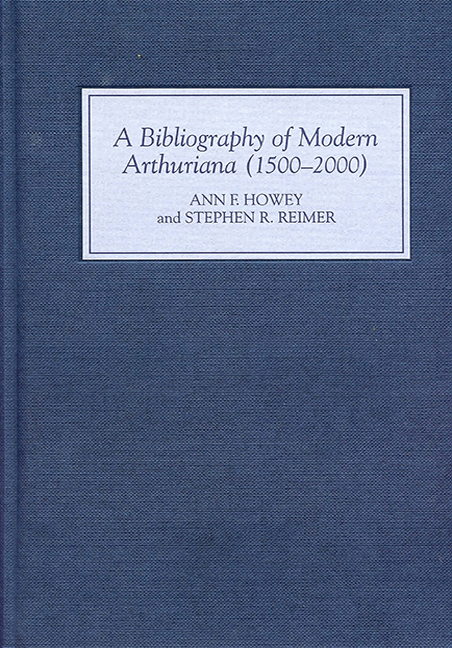Introduction
Published online by Cambridge University Press: 08 April 2017
Summary
In the 1470s, Thomas Malory drew together a variety of Arthurian stories from numerous sources and languages. Since Caxton's publication of Malory's text in 1485, the Arthurian legend in the English-speaking world has experienced sometimes neglect and mockery, sometimes interest and re-imagination. In particular, the proliferation of Arthurian publications in the nineteenth and twentieth centuries has elicited much comment and debate among scholars of the field. Arthur and Guenevere have drawn increasing numbers of characters into their sphere of influence, and increasing numbers of authors, dramatists, painters, musicians, and film-makers have paid homage to the legendary king and queen. Our intention in this bibliography is to list as comprehensively as we can the uses of the Arthurian legend in modern English-language “fiction” (broadly understood, as explained below), from 1500 to 2000.
We have chosen to focus on the fictional representations of Arthur and his court. Of course, the boundaries between fiction and non-fiction can be blurry. Generally, if authors have presented their work as non-fiction, we have taken them at their word and omitted them; Arthurian “self-help” books, for instance, are not included, nor are commentaries on Arthurian traditions. These may be contributions to a body of knowledge or to Arthurian scholarship, but imaginative reworkings of the legend are the focus of this bibliography. We have made occasional exceptions to this rule: for works – such as those that purport to be accounts of true past-life experiences, for example – that we believe will be taken as fiction by many readers and which could themselves become the basis for further fictional works by others; or for works that use a fictional framework – conversations between Merlin and Arthur, for example – to introduce non-fictional material.
Though limiting ourselves to “fiction,” we have interpreted that term quite broadly: in addition to novels, short stories, poems, and drama, we include musical dramas, music (songs or instrumental works), film, television, games, art (including book illustrations), and some comics. Given the limitations of the library resources to which we have access, the Comics section is limited to series or graphic novels with sustained Arthurian content or reputation, and to comic book versions of Arthurian works in other media.
- Type
- Chapter
- Information
- A Bibliography of Modern Arthuriana (1500–2000) , pp. ix - xiiiPublisher: Boydell & BrewerPrint publication year: 2006



